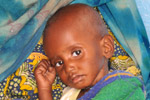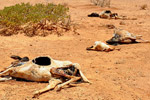Around 800,000 people in Niger face food insecurity in coming months, according to the UN’s Office for the Co-ordination of Humanitarian Affairs (OCHA). Rising food prices and refugees from Mali, which is plagued by conflict, have made access to food difficult in the west African country.
The OCHA calculates that currently 84,000 are in need of immediate aid. Food aid may be required throughout June-August, which is considered the lean season in the region before the harvesting starts around September. In some parts of the country, delivering available grains to market has posed problems.
Food insecurity in Niger is exacerbated by some 60,000 refugees from Mali, where a government coup and conflict in the north pushed many people to flee the country into neighboring Niger. An international military intervention, led by France, has reduced the conflict in Mali though the situation remains precarious.
Niger is found in the Sahel region, which is plagued by inconstant rains and drought, leading to frequent food insecurity. Regional conflict combined with possible impacts from climate change have also played a role.

A farmer collecting millet in Koremairwa village in the Dosso department. Photo by: USDA.
Related articles
Scientists: stop treating population growth as a ‘given’ and empower women

(02/27/2013) Climate change, biodiversity loss, resource depletion, water scarcity, and land issues: almost all of the world’s environmental problems are underpinned by too many people inhabiting a finite planet. A new study in the Proceedings of the Royal Society B warns that overpopulation—combined with over-consumption—is threatening to push the entire globe into “a collapse of global civilization.” But cultural changes, especially more empowerment of women and access to contraceptives, may hold the key to reducing population growth and eventual sustainability.
Alarm rising over food crisis in Sahel region

(06/13/2012) Warnings over a possible famine in Africa’s Sahel region are becoming louder and more intense. Abnormal drought, locally high food prices, and regional conflict have ramped up concerns that 18 million people could suffer from malnutrition and starvation as the lean season sets in. UNICEF says it needs $238 million to save over a million children from severe malnourishment in the region, but has to date only raised $93 million.
The vanishing Niger River imperils tourism and livelihoods in the desert

(06/04/2012) Severely affected by recent turmoil across its northern frontiers, Nigerien tourism pins hope on river valley attractions to play a major role in rebuilding its tourism industry in the upcoming years. Even though the river itself is threatened. Located in the heart of the Sahel Region, the vast desert lands of Niger have captivated European tourists seeking a taste of its immensely varied natural landscapes.
‘The real Hunger Games’: a million children at risk as Sahel region suffers punishing drought

(05/09/2012) The UN warns that a million children in Africa’s Sahel region face malnutrition due to drought in region. In all 15 million people face food insecurity in eight nations across the Sahel, a region that is still recovering from drought and a food crisis of 2010. In some countries the situation is worsened by conflict.
15 million facing food shortages in Africa’s Sahel region
(03/29/2012) The UN announced yesterday that food security in the Sahel region is deteriorating, putting over 15 million people at risk. Ongoing drought combined with conflict, has pushed the region into a crisis. The situation appears eerily similar to last year when Somalia was hit by a devastating famine due to drought and political instability; the famine left an estimated 30,000 children dead.